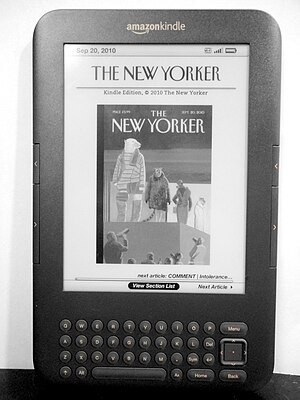| Image via Wikipedia |
The problem with this model is that it excludes many buyers who are not willing to pay the high price, notably myself. If it had been more reasonably priced, say around $20 per season, I would have bought in. And likely so would have thousands of others. In my opinion, many of the DVDs were priced far too high, and many, many sales were lost as a result.
Fast forward to the age of digital content. I'm thinking about buying James Patterson's new hit book 11th Hour from Amazon. I can buy the Kindle version for $14.99 or the hardcover version for $18.77. If I purchase the hard copy version, I can read it, give it away, loan it out, or even sell it. If I purchase the digital version ... well I can read it. End of story.
Publishers for years have bemoaned their high business costs, notably the printing and distribution costs. The claim always has always been that these two costs contributed to the lion's share of the book's cost. Somehow this "lion's share of the costs" amounts only to a miserly $3.78 savings for the consumer purchasing the digital version which virtually eliminates the two largest costs.
When digital products are priced too high, piracy in encouraged. Back in the era of CDs, prices rose to a whopping $24.99 for a new release CD, a price that help kill the entire market. iTunes hit the magic number of 99¢ a tune (now a slightly overpriced $1.29) that made the purchase of a song cheap enough enough to make piracy too bothersome for most people.
In business, it's adapt or die. The major content companies have long history of resisting change (remember it took a computer company to introduce viable digital music sales) of any kind. As well, there is often the mentality of getting the maximum dollar per sale, sometimes to make up for piracy. A great example of doing it right is the Netflix pricing model. At $8 per month, it's hard to imagine the need to illegally download any of the content they offer.
My solution is simple. Lower prices, increase sales, reduce piracy. It's called the new math.
Read: First crack in digal content wall


